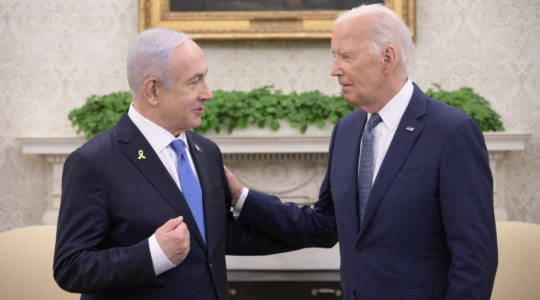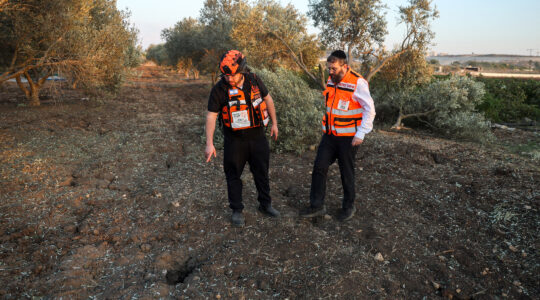JERUSALEM, Feb. 5 (JTA) — Gabi Ashkenazi, the blunt general who takes over as the Israel Defense Forces’ chief of staff next week, faces a mammoth task: Within the next few months he’ll be expected to restructure the army, redefine its operational doctrine and restore its self-belief. Six months after last summer’s war in Lebanon, the IDF is still smarting over its failure to launch a coherent ground operation to stop Hezbollah militiamen from firing hundreds of rockets at Israeli civilians on nearly all 34 days of fighting. That and many other operational shortcomings in the war cost Lt.-Gen. Dan Halutz the chief of staff job. To set things right, Ashkenazi, 52, will have to tackle weighty issues of doctrine, organization and training. And he will have to make far-reaching changes with an eye toward meeting the diverse threats Israel faces from Hezbollah, Syria, Iran and the Palestinians. Ashkenazi is considered one of Israel’s most talented and toughest field officers, but he’ll be hard-pressed to rehabilitate the largely demoralized army and meet the public’s expectations. In the wake of its poor performance in the war, the IDF under Halutz did something unprecedented: It set up more than 40 internal inquiry committees to investigate every aspect of its functioning. Never before has such a thorough, methodical critique of the IDF been conducted. The panels’ findings amount to a detailed work plan. Putting the recommendations into practice will be Ashkenazi’s first priority. Two of the more important investigations, by former Chief of Staff Dan Shomron and former Northern Command head Amiram Levin, pinpointed the IDF’s new battle doctrine as the main reason for the ground forces’ resounding failure. Levin called the battle doctrine “totally wrongheaded” and said it could never work. The doctrine, which some have dubbed “post-heroic” warfare and others call “digital war,” posits that with today’s precision weapons and information technology, wars can be won from a distance without committing troops to close combat. In classical war doctrine, long-distance barrages merely soften up the enemy before armored forces and infantry sweep across enemy territory, smashing and capturing its positions and winning the war. According to the new theory, however, modern technology can pinpoint targets, which are then destroyed by accurate munitions. The display of overwhelming power demoralizes the enemy, who will surrender when he sees he has no chance. As the precision attacks mount, the enemy is said to experience a string of “effects” and “levers” that break his will to resist without ground forces having to overrun and physically capture positions. Victory without committing ground forces saves lives on both sides, in keeping with the main tenet of “post-heroic” warfare. The IDF’s new approach has coincided with a heightened sensitivity in Israeli society to losing soldiers in war, and with what many contend was an exaggerated belief in high-tech air power promoted by Halutz, the first former Air Force commander to become Israeli chief of staff. The new doctrine had major implications for the army as a whole: It meant that ground forces could be downsized and their training reduced. It also meant that Israel’s large reserve army could be cut drastically. The result in the Lebanon war was a hesitancy about committing ground forces, complaints from reservists that they lacked adequate training and no timely ground operation to root out Hezbollah militiamen who continued firing rockets into Israel. Worse yet, when the “effects” and “levers” failed to break Hezbollah, the “digital” IDF had no clear fallback plan. The Shomron and Levin investigations both recommended restoring the tried and tested classical doctrine. Ashkenazi, whose background is in ground warfare, almost certainly will try to rebuild the IDF with that in mind. That will mean altering the current balance between air power and ground forces. Already the IDF intends to spend about 40 percent more on its ground forces this year than it did in 2006. Training will be increased by a similar amount, and the reserves again will be seen as the heart of the armed forces, not a secondary adjunct. As Levin put it in his report: The conscript army is only meant to hold the line until the reserves get to the front. Ashkenazi also will insist on more professional training for top brass at the IDF’s military college. A recent report by the state comptroller suggested that most colonels and brigadier generals had not taken the required courses. Besides the change in doctrine, from which almost everything else flows, Ashkenazi also will want to restore clearer language for defining military objectives and formulating orders. In his scathing report, Shomron wrote that not until Aug. 8 — less than a week before the end of the fighting — were clear war aims defined. The army Ashkenazi builds will have to be big and flexible enough to deal with different challenges: the threat of renewed war with Hezbollah; war with Syria that could involve longer-range missiles; confrontation with Iran in which state-of-the-art “digital warfare” could be crucial; and low-intensity conflict with the Palestinians that might involve a large ground operation in Gaza. How suitable is Ashkenazi for the highly demanding job? He’s a graduate of an army boarding school, served in the famed Golani infantry brigade in every capacity from corporal to commander, in 1994 became the youngest member of the military’s general staff, headed the Northern Command from 1998 to 2002, and was deputy chief of staff from 2002 to 2004. Ashkenazi left the army when he was passed over for the chief of staff post in favor of Halutz, but after the first week of the Lebanon war he was summoned by Defense Minister Amir Peretz to serve as the ministry’s director general. Given his background, Ashkenazi knows the Lebanese theater as well as anyone. There is little doubt that he will be ready for any renewed outbreak of hostilities in the North. But there’s one major caveat: Given the IDF’s preoccupation with its analysis of last summer’s clash with Hezbollah, will Ashkenazi and his generals be preparing the army for the last war or the next one? □

Help ensure Jewish news remains accessible to all. Your donation to the Jewish Telegraphic Agency powers the trusted journalism that has connected Jewish communities worldwide for more than 100 years. With your help, JTA can continue to deliver vital news and insights. Donate today.





